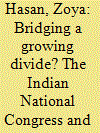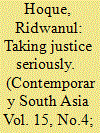|
|
|
Sort Order |
|
|
|
Items / Page
|
|
|
|
|
|
|
| Srl | Item |
| 1 |
ID:
078520


|
|
|
|
|
| Publication |
2006.
|
| Summary/Abstract |
This article draws on long-term ethnographic fieldwork in northern India on historically marginalised women's political participation. In particular, it examines women party activists in Dalit politics and the possibilities for the existence of feminist politics in the spaces analysed dense with masculine powers, caste identity-driven politicians and women's obstacles in building a political career for themselves. It is argued that these women present a theoretical impasse: labelling their practices as non-feminist would negatively connote the subjectivity and agency of those women who are engaged in different political worlds, even when they replicate dominant structures or embody traditions not exclusively based on the gendered individual as an actor or beneficiary of politics. Drawing from a comparison between women in Dalit politics and Hindu Right organisations, women activists are analysed through the lenses of their self-realisation trajectories, theirs and their political movements' relationship (or the absence of such a relationship) with gender progressive agendas, and the individual and collective consequences of their mobilisation. In doing so, this article aims to offer a portrait of women's political agency unconstrained by categories that, by themselves, might only offer partial explanations for everyday political life in a slum, a village or a state capital
|
|
|
|
|
|
|
|
|
|
|
|
|
|
|
|
| 2 |
ID:
078521


|
|
|
|
|
| Publication |
2006.
|
| Summary/Abstract |
The success of the Indian National Congress (INC)-led alliance in the 2004 general elections after years of terminal decline marks a critical juncture in the history of the party and Indian democracy. The 2004 elections were the outcome of a decade-long silent revolt of those who felt left out of the reform process. Efforts by its leadership to achieve organisational and political cohesion while emphasising ideological clarity served to persuade voters that the INC could represent a more inclusive governance approach. However, ever since the INC-led government began implementing social and economic policies designed to pursue the liberalising agenda, it has struggled to reconcile the contradiction between economic reforms that benefit the elite and upper-middle classes and its mass support among the poor who have been the losers in this process. This article examines the structure and pattern of transformation within the INC, both in its policy and strategy and in its organisation and leadership. It considers whether the INC's dual approach of seeking to appease the powerful middle-class constituency while appealing to the economic majority has a deeper strategic purpose of achieving centrism and a broad-based social coalition. It discusses whether this shift in direction signals the arrival of more inclusive development policies to bridge the growing socio-economic divide and, if so, whether this can be sustained in the long term.
|
|
|
|
|
|
|
|
|
|
|
|
|
|
|
|
| 3 |
ID:
078518


|
|
|
|
|
| Publication |
2006.
|
| Summary/Abstract |
While the history of political Islam is intricately connected to southwest Asian geo-politics, there is evidence that the emergence of the religious right as a political force in Pakistan is an outcome of state patronage. Following the 'War on Terror', corporate media and official western representations of revivalist trends in Pakistan have been almost completely de-contextualised. This representation has provided both the dominant military state oligarchy and the religious right an ideal opportunity to reinforce an old alliance previously supported by western imperialism, while eroding the organising capacity of progressive social and political forces in Pakistan. This paper traces the historical contours of the mullah - military alliance in Pakistan, arguing that the political and social survival of both its armed forces and the religious right is based on the persistence of a dialectic relationship between a secular modernity and Islamic ethos that can be traced back to the country's creation. The evolution of this state ideology since Partition demonstrates how the religious right has emerged as a social and political force under state patronage. The paper examines how two critical junctures in this mullah - military alliance - namely, the Afghan jihad (struggle) of the 1980s and the post-9/11 War on Terror - have allowed the state and the religious right in Pakistan to overtly consolidate this historical alliance
|
|
|
|
|
|
|
|
|
|
|
|
|
|
|
|
| 4 |
ID:
078517


|
|
|
|
|
| Summary/Abstract |
As a celebration of the 20th anniversary of the British Association for South Asian Studies (BASAS), its 2006 annual conference marked an auspicious juncture in the history of the association. One of the conference's central themes was to highlight several important shifts, both imminent and long term, in the pace and direction of South Asian studies in the United Kingdom. The unprecedented large international turnout at the conference provided concrete proof that the interdisciplinarity and global reach of the academic community working on this region remains as strong as ever. Growing recognition within the media, government and business of the significance of South Asia in international affairs, particularly the emergence of India as a global economic and political power, has given a much-needed impetus to the spirit and purpose of BASAS. The ambition to maintain and build on the capacity of British and European universities to produce linguistically and culturally skilled South Asianists, both for furthering knowledge as well as meeting the requirements of industry and the diplomatic services, has never before been so crucial. There are promising signs that the role of BASAS in fostering an intellectually vibrant environment for South Asianists is winning broader institutional support. This article surveys the key themes covered during the conference, some of which are well reflected in the diverse range of papers selected for this special edition.
|
|
|
|
|
|
|
|
|
|
|
|
|
|
|
|
| 5 |
ID:
078519


|
|
|
|
|
| Publication |
2006.
|
| Summary/Abstract |
By analysing public interest litigation (PIL) jurisprudence, this article examines Bangladeshi judicial activism in dispensing justice through the promotion and protection of the 'public interest' and imperatives of constitutionalism. Originally linked with the idea of having an accessible judicial system for the wider community, PIL in Bangladesh previously focused primarily on 'the weak', as well as on pure rights. However, while PIL has recently extended its stake to a broader set of constitutional issues, it has not delivered on its promises. It is said that the elitist use of PIL has undermined a much-needed focus on social justice and public empowerment. This article argues that PIL's underperformance is not rooted in its elite-driven use alone, but is also a consequence of judicial unwillingness to remain jurisprudentially creative. Adopting a broader rather than minimalist approach to PIL, it focuses on the limits of social-rights-centric concept of social justice, and argues that enforcing principles of constitutionalism through PIL, even if pursued by the elites, could be a viable avenue towards social and constitutional justice
|
|
|
|
|
|
|
|
|
|
|
|
|
|
|
|
|
|
|
|
|